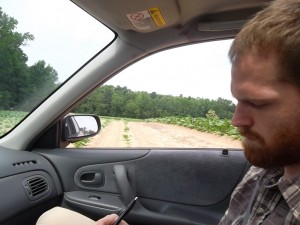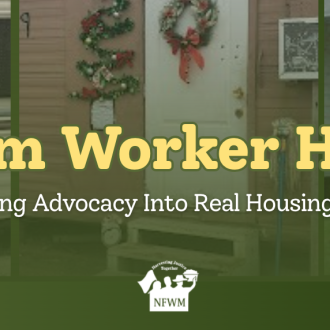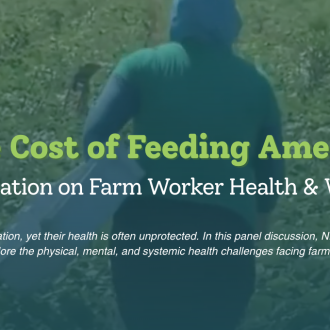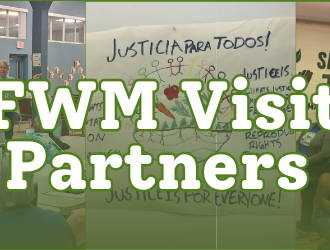
Ryan Nilsen, NFWM intern through Duke Divinity School
In our evening outreach to farm workers over the past few weeks, Octavio and I have ended up being able to have quite a few conversations with farm owners as well as farm workers. We don’t really seek them out (as most of them already speak English quite well), but we’ve found that many workers live in trailers or old houses near a field behind the farmer’s house. Because of this, we often have to drive basically right down someone’s driveway and past their home in order to get to the worker housing hidden back somewhere removed from the road. As we drive by the house, an older white man or couple will typically approach us wondering what we’re up to or looking for. When these types of encounters have occurred, I’ve been really grateful to discover that most of the farmers we have interacted with have been really nice people. Even if a little hesitant at first, they are usually interested in talking for a few minutes about the growing season or the English class that we are organizing and even helpful in pointing us toward the workers’ housing. Many are small farmers employing only a few workers who, based on my read of their accents and knowledge of this part of the state, probably come from families who have been in the area for quite a while.
Despite that the conversation about farm worker rights can at times begin to sound somewhat anti-farmer because of the horror stories that we hear about substandard housing and working conditions, it makes sense to me that many small farmers would be sympathetic to the struggles of their workers. Several of my closest friends, largely because of their convictions about how messed up our conventional food system has gotten, want to be small farmers themselves and are working hard to figure out how to make that economically feasible. I hear from them all the time about how U.S. agricultural policy makes it very difficult for small farmers to continue to exist and make any sort of profits these days. As Charlie Thompson (a onetime small-scale produce farmer in North Carolina himself) describes in the second chapter of the book The Human Cost of Food, the major changes in our agricultural system over the last roughly half century can be characterized by two major trends: “the depopulation of small farmers and the consequent use of temporary workers who have replaced their labor contributions on the now larger farms but who do not control any of the market as small farmers once did” (56). (I highly recommend this book if you are interested in understanding the more human-oriented consequences of our current food system. It’s been helping me out a lot.) Though certainly in varying degrees, small farmers and farm workers in our country both are victims of often the same violent economic forces outside of their direct control and agricultural policy that simply does not have their interests in mind. It seems natural to me that small farmers would recognize in their labor force another group of people who are oppressed by agribusiness and our economic system and be as supportive of them as possible.
Nonetheless, not everyone seems to feel this way. Even our attempts to share information about an English class have been met with suspicion and even resistance at a few of the farms we have visited. Last week, one farmer in particular very sternly refused to let us see the workers after their work hours had ended. Without us even saying anything about housing, he jumped into an elaborate defense about how great their housing conditions were – apparently with AC, hardwood floors, and well-kept lawns. The conversation was tense for some reason that wasn’t immediate to us and that we couldn’t easily identify. Having people from the outside even come in to visit the workers in their homes appeared to be a threat to him. When we returned a few days later to meet with several workers during their lunch break, one
informed us that if we were with the union, el Patrón had said we weren’t allowed to be there. Since we weren’t representing the union,

we stayed and talked with several groups of workers about the English classes. A few of them expressed quite a bit of interest and signed up.
I don’t know what history this farmer had that made him so fearful, but this experience did remind me that, while many farmers may be nice and even sympathize with the struggles of farm workers, the wellbeing of those workers simply cannot be under the whim and control of individual farmers. These farmers are under serious pressure and are pushed by forces out of their control to make everything about the bottom line. A nice farmer is no defense against weak policies that do not protect some of the most important laborers in our economy.



